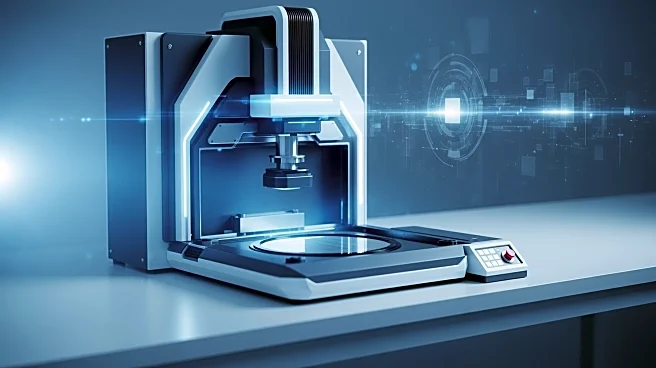What's Happening?
The Indian Institute of Technology (IIT) Madras has partnered with Applied Materials India to implement the AppliedTwin digital twin framework, aimed at advancing semiconductor research and workforce development. This collaboration involves the deployment
of a sophisticated digital twin solution designed to model and optimize semiconductor manufacturing equipment and processes. A workshop on the AppliedTwin framework was recently conducted at IIT Madras, attracting over 150 students and faculty members. The initiative is part of a broader plan to establish a semiconductor fabrication facility in Tamil Nadu, which will include integrated reliability and packaging capabilities. The AppliedTwin framework is expected to significantly reduce research and development costs and time by enabling virtual concept creation, prototyping, testing, and process exploration.
Why It's Important?
This collaboration is a significant step towards strengthening India's semiconductor research and development infrastructure. By integrating advanced digital twin technologies into the curriculum and research at IIT Madras, the initiative aims to contribute to India's goal of becoming a global hub for semiconductor design and manufacturing. The partnership is expected to foster collaboration across suppliers, government, customers, and R&D institutions, thereby supporting the development of India's semiconductor ecosystem. The initiative also provides students and researchers with access to virtualized semiconductor process experimentation, offering hands-on understanding of real fabrication workflows before the country's physical FAB infrastructure is fully operational.
What's Next?
The deployment of the AppliedTwin framework at IIT Madras is expected to pave the way for further advancements in semiconductor research and development in India. As the semiconductor fabrication facility in Tamil Nadu progresses, it will likely attract more collaborations and investments in the sector. The initiative may also lead to the development of a skilled workforce ready to meet the demands of the semiconductor industry. Additionally, the collaboration could inspire similar partnerships between educational institutions and industry players, further boosting India's position in the global semiconductor market.
Beyond the Headlines
The integration of digital twin technologies in semiconductor research not only accelerates innovation but also aligns with global trends towards digital transformation in manufacturing. This approach could lead to more sustainable and efficient manufacturing processes, reducing waste and energy consumption. Furthermore, the initiative highlights the importance of industry-academia collaborations in driving technological advancements and economic growth. As India continues to invest in its semiconductor capabilities, it may also influence policy decisions related to technology and innovation, potentially leading to more supportive regulatory environments for the tech industry.















